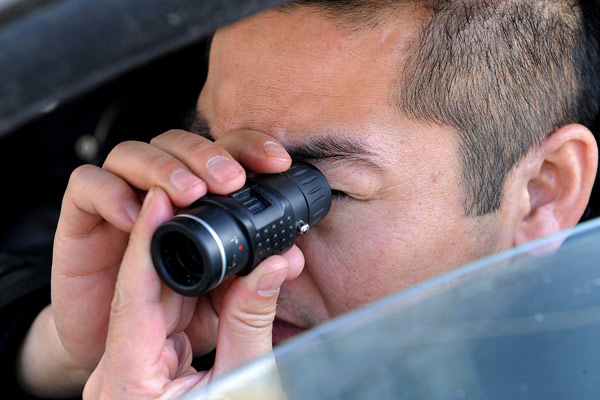

Private investigators and legal experts call for tighter control of agencies in bid to protect rights and fight corruption. Cao Li in Beijing reports.
Wang Yu stood in the street covered with thick layers of clothes, his face hidden by a scarf, mask, glasses and hat -- and it was not just because of the cold weather.
For two weeks, he has been staking out a small house from across the street from morning to night. When the owner emerges, he follows him in the hope of completing his mission: uncovering an underground network trading in counterfeit cigarettes.
|
 Zheng Yuxin, founder of Gelei Business Investigations, stakes out a property from a car. His firm is based in Urumqi, capital of the Xinjiang Uygur autonomous region, and is regularly involved in IPR crackdowns. [Zhang Wande / For China Daily]
|
As a private investigator, Wang is assisting Anshan's industry and commerce bureau in Northeast China's Liaoning province with its massive crackdown on fake goods.
His previous client was a 40-year-old woman in Beijing who hired him to track her cheating husband for 24 hours a day to collect evidence for a divorce. His next will be to trace a missing teenager who is believed to have run away with friends from the Internet.
Wang, who did not want his real name to be used, and his fellow detectives have seen a steady increase in demand for their services in recent years. Yet, despite their success in China, they are now the ones being investigated, over accusations of privacy violations and the use of illegal methods and devices.
A revision to the country's Criminal Law in 2009 that outlaws the trading of personal information has also put detection activities under further scrutiny.

Former soldier Yuan Zheng, 33, will spend the Spring Festival holidays in a Beijing prison for illegal possession of personal information. He will serve a year after being convicted at Haidian District People's Court in December.
He established Dongfang Mosi Business Investigation in June 2009 with his partner, Yong Zhengde, a 36-year-old man who can barely write his own name (he is also serving one year in prison). Their services included collecting debts, probing allegations of infidelity and collecting personal information. When police raided their offices in 2010, officers found a range of devices, including hidden camera equipment.
"This is a new crime," said Zhang Peng, a judge at No 1 Criminal Court who presided over Yuan's case. Of the six charges of illegal possession of personal information he has tried, two involved private investigators. "They illegally obtained personal information, such as bank and residency details, assets and phone records, and sold them for money," said the judge.
According to Chinese law, only police and State security officials can legally gain access to personal information to investigate crimes. Zhang added: "The use of personal information must be under strict control. Otherwise it could be used to facilitate crimes."
In Yuan's defense, a client surnamed Chen argued in court that, in litigation, people have to provide evidence to support their claims, yet most people do not have the ability to collect it and lawyers are unwilling to take on difficult jobs. "Why not let them do it?" he said in an interview with Procuratorial Daily, a periodical published by Supreme People's Procuratorate.
Since the first private investigation firm was founded in Shanghai in the 1990s, the number of detectives has risen to more than 200,000, despite repeated judicial attempts to outlaw the business.
The Ministry of Public Security banned private investigations in 1993 to stop detectives exercising powers that are exclusive to government law enforcement. Nine years later, however, the Supreme People's Court released a contradicting directive that allows the use of evidence collected through secret video and sound recordings.
To get around the revised Criminal Law, which hit the industry hard in 2009, vast numbers of detectives registered as business consultants instead of investigators. This allowed them to operate in a gray area, free from effective regulation.
With the increase in demand brought on by China's economic and social development, the number of litigations has also risen sharply. So too has the use of illegal methods and devices by private detectives.
Tao Xinliang, a lawyer and dean of Shanghai University's intellectual property school, said his law firm hires private investigators to collect information because "violations are rampant and obtaining evidence is becoming more difficult".







